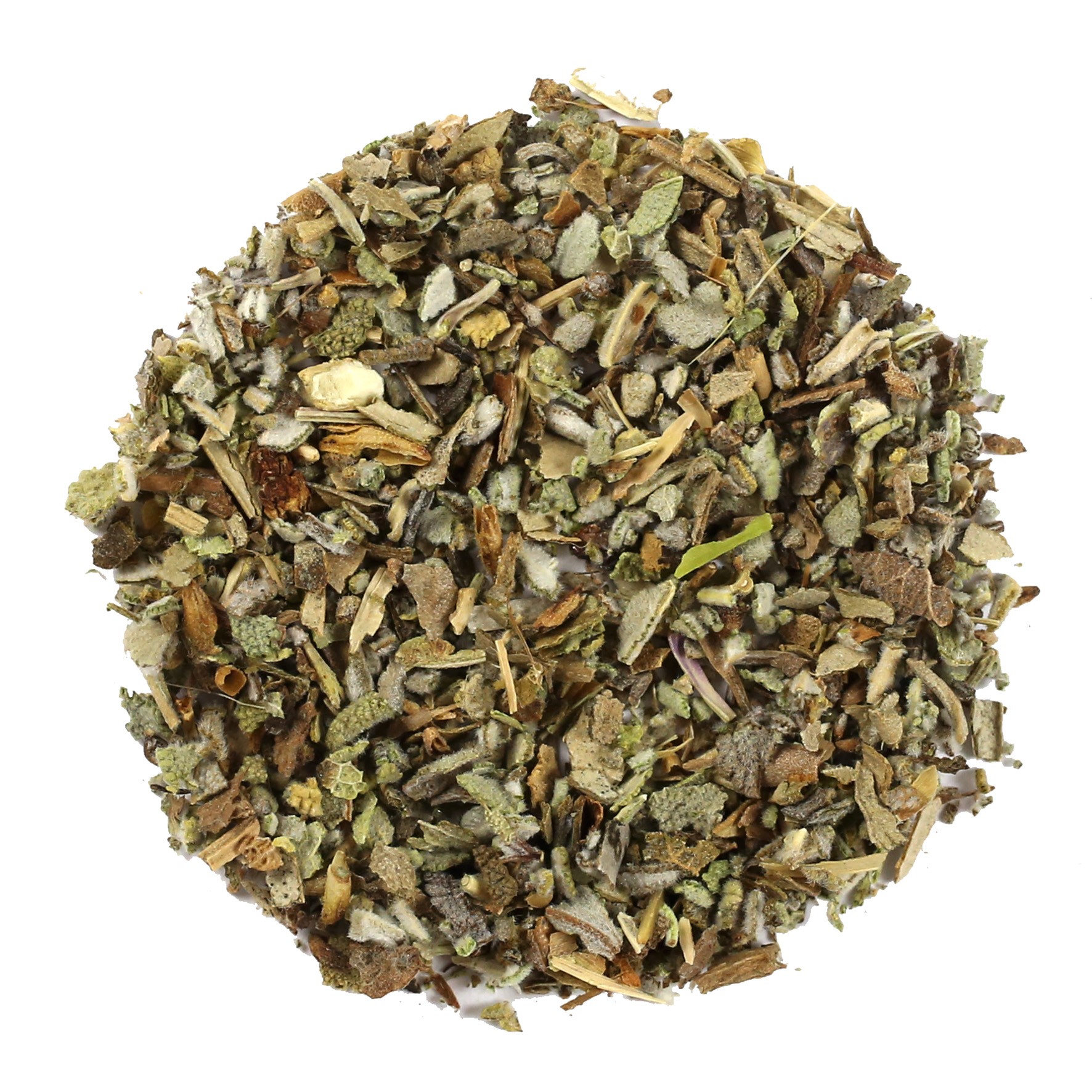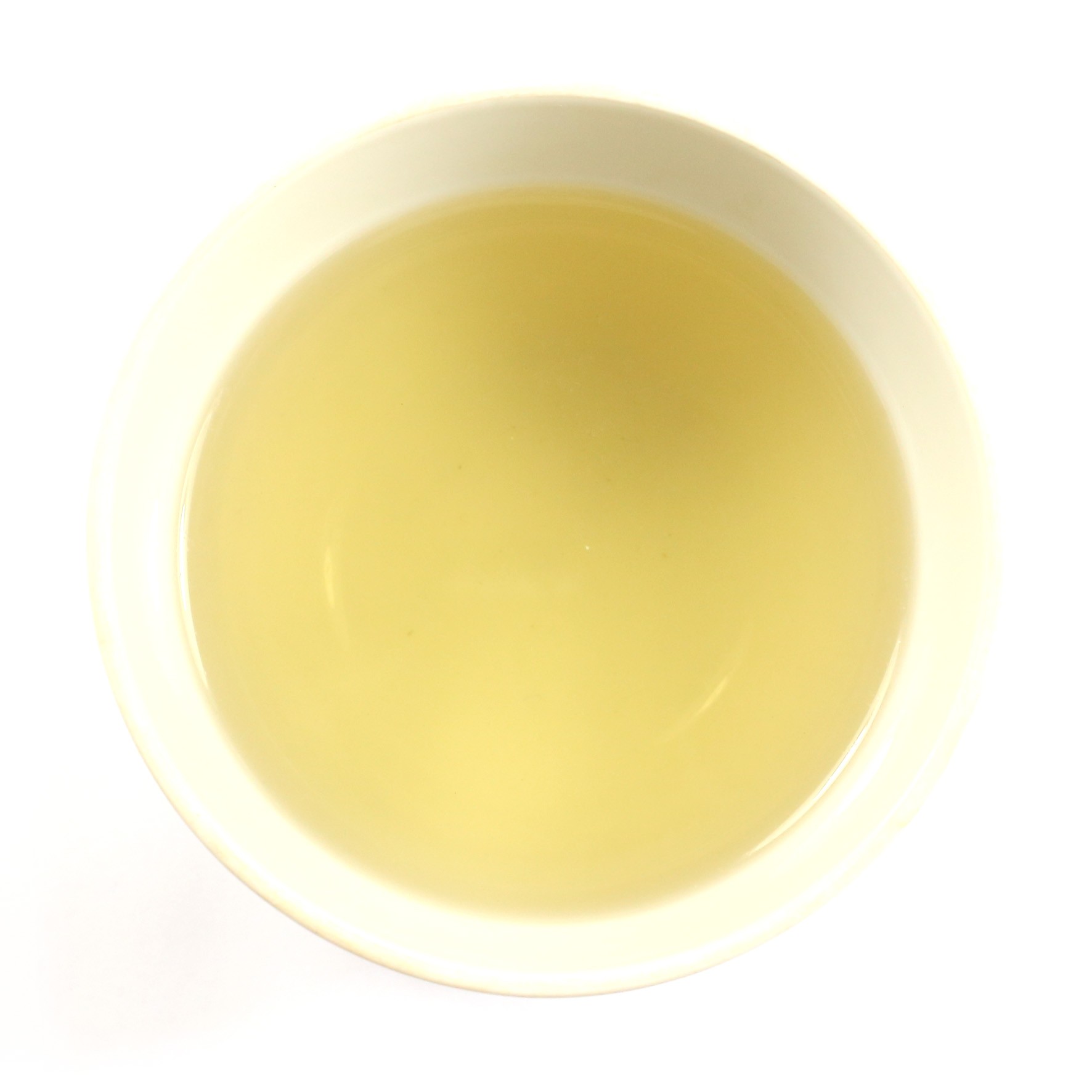Herbal Tea Brewing Guide

1 Teaspoon
Add 1 teaspoon per person and one for the pot.

95⁰c - 100⁰c
Boil using fresh water, at a temperature of 95⁰ - 100⁰c.

8 - 10 Mins
Steep for 8-10 minutes, depending on personal preference.
About Product
-
Product Description
Sage Tea, also commonly known as Sage Leaf Tea, is a celebrated beverage revered not only for its robust flavour and rich aroma but also for its extensive array of health benefits. This herbal infusion, crafted utilising the leaves of the sage plant, has a rich legacy embedded in global traditional medicine and culinary practices.
The multifarious advantages of it, coupled with its simplistic preparation, have rendered it a favoured choice in the realm of herbal teas. When one embarks on the journey to understand this tea, they delve into not just a unique flavour palate, but also an intriguing amalgamation of culture, history, and wellness.
We are committed to providing our customers with the very best of Sage Leaves Tea. To uphold this commitment, we undertake a practice of packing all orders fresh, immediately upon receiving the order. This approach ensures that every sip delivers rich, robust flavours.
What is Sage Tea
A flavourful infusion prepared from the leaves of Salvia officinalis, a perennial, evergreen shrub from the mint family. This esteemed plant, native to the Mediterranean region, is today cultivated globally in well-drained, sandy or loamy soils under full sun. The optimal climate for cultivating sage is warm and relatively dry, making it a common crop in countries such as Greece, Italy, and Turkey.
Botanically, the plant is characterized by its woody stems, greyish leaves, and purple, blue, or white flowers. The highly aromatic leaves are the key ingredient in the Tea. They are typically oval and feature a pebbled-veined, wrinkled surface, and their colour can range from silvery-grey to green.
The plant flowers in late spring or summer, yield flowers that attract pollinators, further aiding the plant’s propagation and dominance in the ecosystem.
Whether savoured for its unique flavour or its health-enhancing properties, Sage Tea embodies a remarkable fusion of nature’s bounty and human ingenuity. This aromatic beverage continues to be a testament to the plant’s resilience and adaptability, thriving in varied climatic conditions, and delighting tea enthusiasts the world over.
History of Sage Tea
The history of Sage Tea dates back several millennia, with roots deeply embedded in the Mediterranean region. Many historical accounts attribute the usage of this for therapeutic and culinary purposes to ancient Greek and Roman civilizations. The Romans regarded sage as a sacred herb, using it in various rituals and ceremonies, while the Greeks used it to promote overall health and longevity.
The name ‘sage’ itself is derived from the Latin word ‘Salvere,’ which translates to ‘save’ or ‘heal.’ This underscores the importance of this plant in ancient medicinal practices, and why it was often referred to as the ‘healing plant.’ Throughout the Middle Ages, it garnered a reputation as a panacea, capable of treating a myriad of ailments. Monks cultivated it in monastery gardens and used the leaves to prepare a therapeutic brew, the precursor to Sage Leaf Tea.
The journey continued through the centuries, spreading across Europe, and later reaching the shores of North America with the explorers. Today, it holds a special place in the herbal tea world, with its consumption spanning the globe.
In contemporary society, Sage Tea is appreciated not only for its health benefits but also for its unique flavour and aroma. Advances in cultivation and processing techniques have made it more accessible to herbal tea enthusiasts worldwide.
Despite the passage of time and the evolution of tea drinking habits, the essence of Sage Tea, steeped in tradition and wellness, remains unaltered. Thus, this ancient brew continues to offer a taste of history with every cup.
How to Make Sage Tea
Creating the perfect cup is an art in itself. Here, we provide a simple, step-by-step guide to help you brew a delicious and therapeutic cup using Loose Tea from our online store.
Ingredients:
- 1-2 teaspoons of loose Sage Tea leaves
- 1 cup of freshly boiled water
- Optional: Honey, Lemon, or other sweeteners to taste
Procedure:
- Boil the Water: Begin by bringing a cup of fresh, cold water to a rolling boil.
- Prepare the Sage Leaves: While the water boils, take 1-2 teaspoons of loose Sage. Remember, the strength of the tea depends on the quantity of the leaves, so adjust accordingly to your taste.
- Steep the Tea: Once the water has boiled, pour it over the sage leaves in a cup or teapot. Cover the vessel to prevent the volatile oils, which hold much of the flavour and aroma, from escaping.
- Wait for the Magic: Let the tea steep for approximately 5 to 10 minutes, depending on your flavour preference. The longer the leaves are steep, the stronger the flavour will be.
- Strain and Serve: Strain the tea into a cup. At this point, you can add any sweeteners or add-ons like honey or lemon.
- Savour the Brew: Your cup of Sage Tea is now ready! Enjoy it hot and immerse yourself in its rich, aromatic flavours.
Tasting Notes: Delicate and sweet flavour, complemented by earthy notes.
Caffeine Content: Being an herbal infusion, is naturally caffeine-free. This makes it an excellent choice for individuals looking to reduce their caffeine intake or seeking a soothing drink for the evenings that won’t interfere with their sleep patterns.
Time of Day: Enjoy the finest taste experience by savouring our product in between meals. Embrace the delicate blend of sweet and slightly astringent flavours.
Storage Advice: To retain the freshness and potency, it’s crucial to store it correctly. Keep the tea in an airtight, opaque container to protect it from air, light, and moisture. Store it in a cool, dry place away from strong odours or spices, as these can compromise the tea’s taste and aroma. With proper storage, you can enjoy it for up to two years.
What is Sage Tea Good For
Steeped in a wealth of health-enhancing compounds, offers numerous benefits that contribute towards overall well-being. Here, we outline some of these benefits:
- Antioxidant Properties: Rich in antioxidants, which help protect the body against oxidative stress and combat the damaging effects of free radicals.
- Aids Digestion: Regular consumption of Sage Tea can assist in the digestion process, alleviating discomfort from bloating and upset stomach.
- Boosts Cognitive Function: Some studies suggest that it may enhance memory and cognitive functions.
- Anti-Inflammatory Effects: Carrying anti-inflammatory properties, making it beneficial for those with inflammatory conditions.
- Supports Oral Health: Traditionally, it has been used as a natural remedy for dental problems, owing to its antimicrobial action.
For a more comprehensive understanding the benefits, you can delve into this topic in our detailed blog post,”Sage Tea Benefits“.
In conclusion, itis a versatile and ancient brew that offers a unique flavour experience, coupled with numerous health benefits. Its popularity has stood the test of time, making it an essential addition to any herbal tea collection.
Overall, the journey of Sage Tea intertwined tradition, culture, and wellness in a single cup, making it a truly special herbal tea. So why not give it a try?
-
Delivery Information
We offer reliable delivery services through Royal Mail to ensure that your orders reach you on time.
Here are the main points you should be aware of:
- Standard UK Delivery: £3.95 excluding delivery charge.
- Delivery Times: Orders are processed and dispatched within 2-5 working days but they may take longer during busy times. It is worth noting that all our orders are packed by hand in order to maintain the quality.
- Free Delivery: We are delighted to provide free shipping for UK orders over £35*. Moreover, customers from Europe can enjoy free shipping for any purchase above €75*. Furthermore, we offer free delivery in the USA for all purchases exceeding $125*. Please note terms and conditions may apply.
- Tracking: When your package is sent you will receive a tracking number via email so as to keep tabs of its progress.
International Shipping
We do ship worldwide meaning our products can be accessed by anyone around the world.
Here are some important details:
- Delivery Times: International deliveries vary based on destination, generally taking between 7-14 working days.
- Shipping Costs: International shipping costs are calculated at checkout based on your location and weight of your order. View full delivery charges for your location.
- Customs and Import Duties: Remember customs or import duties may exist depending on regulations in your country; these charges are borne by the customer.
Returns Policy
Your satisfaction is our top priority, however if for any reasons you’re not completely happy with your purchase, simply follow our returns procedure:
- Eligibility: Items returned within 30 days of receipt must remain unopened and in their original condition.
- Process: In order to return an item contact our customer service department using your unique order number after which detailed instructions will be given concerning returning them back to us securely.
- Refunds: Our aim is to refund you within 5-7 working days upon successful reception of returned goods. The refund amount will be credited to your original payment method.
For any other Enquiries or help please contact our Customer Support Team always at your service.
-
Product Reviews

 Loose Leaf Tea
Loose Leaf Tea Pyramids
Pyramids Tea Bags
Tea Bags Africa
Africa Assam
Assam Ceylon
Ceylon Chinese
Chinese Darjeeling
Darjeeling European
European Indian
Indian Japan
Japan Nepal
Nepal South East Asia
South East Asia Ayurveda Tea
Ayurveda Tea Black Tea
Black Tea Chai Tea
Chai Tea Flowering Tea
Flowering Tea Fruit Tisanes
Fruit Tisanes Green Tea
Green Tea Herbal Tea
Herbal Tea Matcha Tea
Matcha Tea Oolong Tea
Oolong Tea Organic Tea
Organic Tea Pu erh Tea
Pu erh Tea Rooibos Tea
Rooibos Tea White Tea
White Tea Asian Coffee
Asian Coffee Caribbean Coffee
Caribbean Coffee Central American Coffee
Central American Coffee South American Coffee
South American Coffee Coffee Blends
Coffee Blends Decaffeinated Coffee
Decaffeinated Coffee Espresso Coffee
Espresso Coffee Ethically Sourced Coffee
Ethically Sourced Coffee Flavoured Coffee
Flavoured Coffee Organic Coffee
Organic Coffee Single Origin Coffee
Single Origin Coffee Chocolate 1
Chocolate 1 Chocolate 2
Chocolate 2 Chocolate 3
Chocolate 3 Chocolate 4
Chocolate 4 Chocolate 5
Chocolate 5 Chocolate 6
Chocolate 6 Chocolate 7
Chocolate 7 Chocolate 8
Chocolate 8 Chocolate 9
Chocolate 9 Loose Tea Filters
Loose Tea Filters Tea Accessories
Tea Accessories Tea Bricks
Tea Bricks Tea Caddies
Tea Caddies Tea Caddy Spoons
Tea Caddy Spoons Tea Gift Ideas
Tea Gift Ideas Tea Infusers
Tea Infusers Tea Strainers
Tea Strainers



